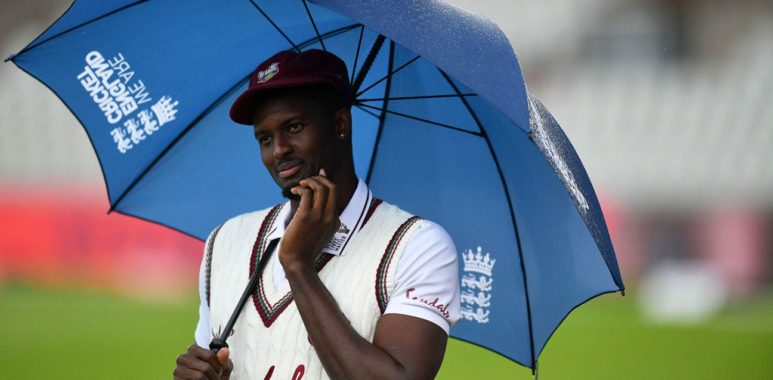
Jason Holder calls on ECB to show gratitude with reciprocal tour
Jason Holder has called on the ECB to show their gratitude to his West Indies team by scheduling a reciprocal tour of the Caribbean later this year, after warning that the dire finances of what he termed Test cricket’s “smaller countries” may not survive the bio-secure requirements of the ongoing Covid-19 pandemic.
Speaking in the aftermath of England’s 269-run victory in the third and final Test at Emirates Old Trafford, Holder conceded that mental fatigue had been a significant factor in his team’s failure to build on their four-wicket win at the Ageas Bowl earlier this month, adding that the routine of “opening your curtains and just seeing the cricket ground” had proven difficult for his players when trying to rouse themselves for the rigours of Test cricket.
However, he also acknowledged that there could have been no other way for the series to take place in the current circumstances, pointing out that only England, India and Australia – the so-called “Big Three” Test nations – have enough financial clout to stage international cricket in the midst of a global lockdown.
“If something doesn’t happen soon we’ll see less international cricket being played by smaller countries because we simply can’t afford it,” Holder said. “We’ve gone from having four, five-match series, down to two and three. And it’s very difficult to host any more than that for us, particularly the Caribbean.
“So yeah, it is a serious dilemma that we’re faced with. I think the relevant personnel really need to sit down and have a look at it.”
Despite their series loss, West Indies will return to the Caribbean with the ECB’s lasting gratitude, after their players agreed – with just three exceptions – to travel to a country with one of the highest Covid death rates in the world, and confine themselves to just two venues for the entire eight-week duration of their tour.
After an initial month in Manchester, where their extended 25-man squad lived and trained on-site, including two intra-squad warm-up matches, the players travelled to Southampton for the first Test, then straight back to Manchester thereafter. Each of the three Tests was worth an estimated £20 million, contests that helped to fulfil the ECB’s contractual obligations to Sky Sports, and offset a loss that Tom Harrison, the ECB chief executive, had estimated could have been upwards of £380 million had no cricket at all been played this summer.
ALSO READ: Stuart Broad joins elite company after 500th Test scalp
There were, however, some significant overheads for the ECB to factor into West Indies’ visit – not least the cost of charter flights from the Caribbean and accommodation for an enlarged group of players – and while the size of the ECB’s £1.1 billion broadcasting deal amply justified the outlay, Holder warned that bilateral series involving less high-profile teams could remain in serious jeopardy for the foreseeable.
“We only really make money from England, and I think India,” Holder said, relating conversations with Johnny Grave, the CWI chief executive. “We break even with Pakistan and Australia, and all the rest of the series we play are losses. But in these trying times only England, Australia and India can probably host cricket. Outside of that, the smaller territories are struggling financially to get cricket on.
“We don’t know what’s going to happen after this series in terms of the international calendar, but if there’s an opportunity for England to come over to the Caribbean before the end of the year, I’m sure that would help significantly for Cricket West Indies’ financial records.
“It’s been a tough couple of years in West Indies cricket financially,” he added. “We’ve pretty much had to take a pay cut, so if it’s possible to host a tour before the end of 2020, it would probably keep us afloat as an organisation.”
Despite the hardships of the bio-secure arrangements, Holder said that one undoubted positive had been the opportunity for West Indies to train among themselves in an enlarged squad, especially given how little opportunity the players have had in recent seasons to take part in the regional first-class competition.
“I’ve thoroughly enjoyed the experience,” said Holder. “It’s the first time I’ve had the opportunity to mingle with, more or less, the A-team players, because I haven’t played much first-class cricket in the last couple of years.
“It just shows you that we need more of these environments in West Indies cricket. I’m not sure right now if Cricket West Indies could afford to have an academy, or something similar to Loughborough here in England, but that is definitely something that would help CWI.
“But the beauty of having 25 players on tour is that we had pretty intense sessions,” he added. “Intensity was definitely at a height in practice, and the guys had the opportunity come over here and learn.
“We need more of these programmes in the Caribbean, but again, it all boils down to finance. We are having a massive difficulty in trying to fund our cricket, from every single age group level to Under-18 programmes and development programmes and we pretty much only gain from hosting England.”
Asked if there was anything in the short term that West Indies could do to improve their fortunes, particularly with regard to first-class opportunities for the likes of Shai Hope, who has not played domestically for three years and struggled to a top score of 31 in six innings, Holder was blunt.
“I don’t think there’s anything more that can be done,” he said. “We don’t have the bargaining power to dictate where and when we can play series. There’s a Future Tours Programme in place, so we’ve got to make sure that we are strategic and plan our cricket in the best possible way.
“I particularly am a perfect example of our system, where I haven’t had the opportunity to play much first-class cricket. This year was the first first-class game I’ve played for couple of years. And I’m the captain of the West Indies cricket team.
“It is what it is. We’ve just got to find creative ways to keep pumping money into our development programmes so we can see more people like Jermaine Blackwood having an opportunity to play first-class cricket, and having a franchise system that can harness and develop that talent. At the moment, a lot of our franchises rely solely on financial distributions from Cricket West Indies. None of them can stand on their own.

